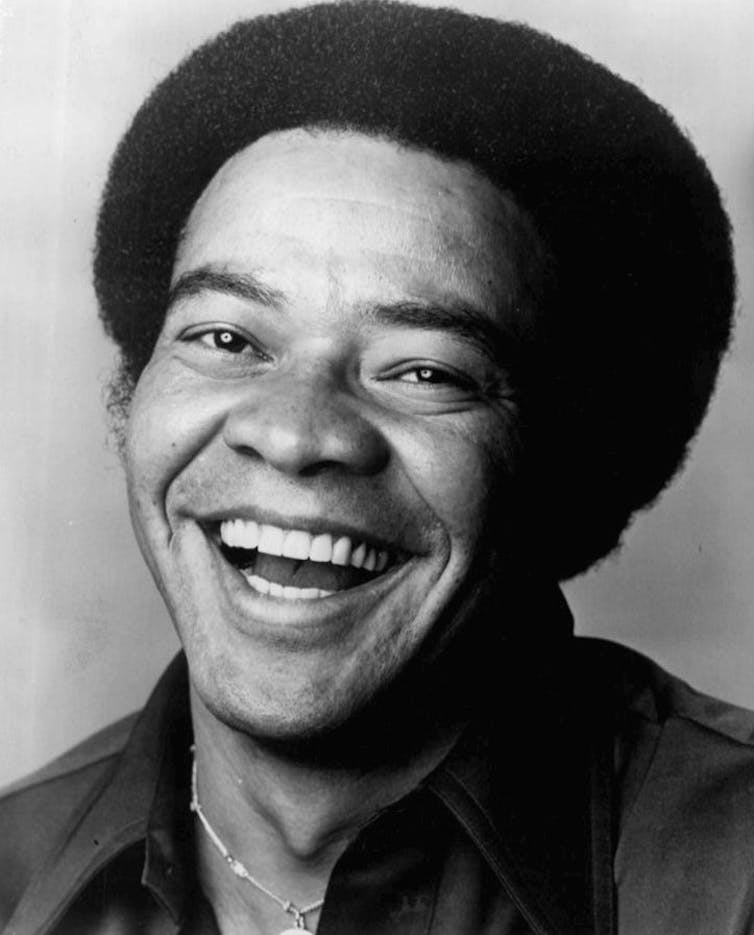Conversation Bill Withers
Comment: Bill Withers: soul music’s ‘everyman’
Published on: 8 April 2020
Writing for The Conversation, Dr Adam Behr discusses how Bill Withers wrote songs the world could lean on.

Even before Bill Withers passed away from heart complications at the end of March, his 1972 hit Lean on Me had already become something of a marker for public solidarity in the face of the coronavirus. From schoolchildren in Scotland, to quarantined apartment residents in Dallas and online virtual choirs around the world, the song has been a prominent feature of musical responses to the crisis.
This is unsurprising. It was already a staple of charity concerts, and had been performed at the presidential inaugurations of both Barack Obama and Bill Clinton.
Its appeal, like much of Withers’ music, lies in its accessibility, universality and the simplicity with which it aligns the spiritual and the secular. Simple, however, isn’t the same as easy. What made Withers distinctive was the extensive applicability of his songs, and the deceptive ease with which he packed straightforward structures with emotional content.
This was of a piece with his background and uncharacteristic path into – and out of – music making. Having grown up in the hardscrabble mining town of Slab Fork, West Virginia, he arrived in Los Angeles to begin a music career – self-taught and having overcome a stutter – after a nine-year stint in the US Navy.
Uncertain and rough around the edges, he kept his job at the aircraft factory throughout the recording of his first album. He had to be told by an impressed Graham Nash: “You don’t know how good you are”, and can be seen carrying his factory lunch box on the cover of his debut album.
The power of understatement
This is reflected in his work, which carries an air of understatement that reinforces its effect. Having imbibed the country music as well as the gospel of his hometown, Withers straddled the traditional hinterland of soul music and the emerging “singer-songwriter” format, and has been described as “the last African-American Everyman”.
His rich baritone notwithstanding, and despite undoubted vocal prowess (the long-held note on Lovely Day, for instance) he largely eschewed the pushing at the edges of the range that marked much soul music of the 60s, and the vocal gymnastics that followed in the 1980s.
His songs, also, veered away from the punch and pomp of the genre. As he described it in a 2009 BBC documentary, the record companies had a different idea:
They didn’t want me to do anything quiet. They had this rhythm and blues syndrome in their mind, with the horns, and the three chicks and the gold lamé suit, and I wasn’t really into that. I had a job … I don’t need you guys.
The power of Withers’ music rests in the way it aligns the purely personal with wider concerns, often through straight description, filtered through well-crafted turns of phrase. Grandma’s Hands, for instance, depicts growing up in a deprived neighbourhood, and generations of experience, through an account of his own grandmother, who helped to bring him up.
The Vietnam War is addressed through the ostensibly prosaic device of a letter dictated by a veteran who says, having lost his right arm, I Can’t Write Left Handed.
Just a regular guy
As a result of this, he has had a disproportionately large impact from a comparatively short recording career – nine studio albums in total, and a live album recorded at the Carnegie Hall, that stands as a paragon of the form, all in an active recording career of eight years between his first release in 1971 and his final album in 1985, with an eight-year hiatus due to tensions with his record company.
These tensions were eventually to lead to him walking away from the industry altogether. Ambivalent from the start, he erased one album over a pay dispute and his relationship with Columbia finally deteriorated due to what he saw as the failure of the “blaxperts” – his label for the record company personnel, to accommodate his own style. The “fame game”, as he called it, “was kicking my ass”. Comfortable in his own skin, and with his legacy, by 1985, Withers felt no need to either fight, or compromise.
I’m very pleased with my life how it is. This business came to me in my 30s. I was socialised as a regular guy. I never felt like I owned it or it owned me.
This is an unusual outcome for so successful a career, to be sure. But it’s entirely consistent with his music. Some artists achieve longevity through constant evolution and overt experimentation. Others do so by carving a decades-long trail through the charts. Withers managed to create a host of canonical songs through his capacity to translate his own experience into both danceable and widely resonant grooves – from the friendship of Lean on Me through the darker hues of Who Is He and What Is He To You to the socially inflected commentary of Harlem.
It was less that he worked in a form that no-one else was using. Just that he did it better than most.
Of his induction into the Rock and Roll Hall of Fame in 2015, he said:
I’m not a virtuoso, but I was able to write songs that people could identify with. I don’t think I’ve done bad for a guy from Slab Fork, West Virginia.
Not bad, indeed. As the subsequent years, and the hundreds of multiple and varied covers and samples of his songs have shown, people continue to lean on his music and will be doing so for a long time to come.
Adam Behr, Lecturer in Popular and Contemporary Music, Newcastle University
This article is republished from The Conversation under a Creative Commons license. Read the original article.



